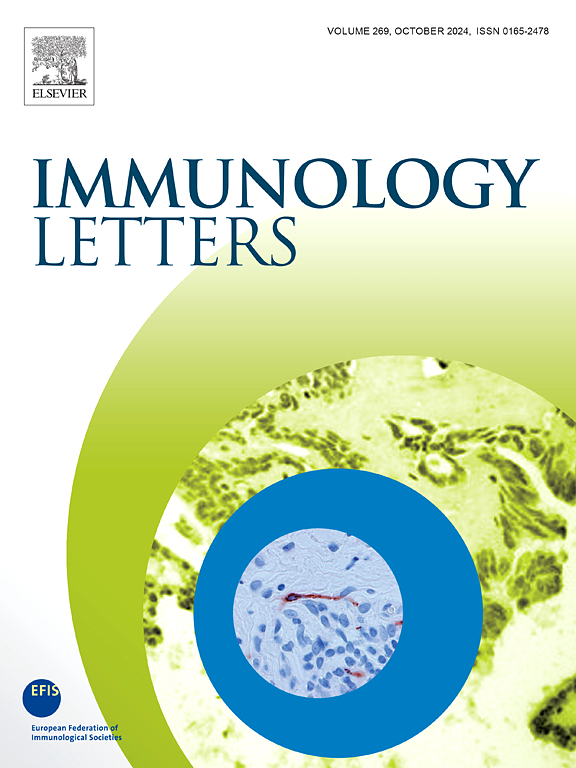IL-21促进质母细胞分化,独立于体外增殖。
IF 2.8
4区 医学
Q3 IMMUNOLOGY
引用次数: 0
摘要
IgE和IgG1同型抗体与2型免疫相关。在体内,IL-4能提高两者的产生,但IL-21对两者的影响不同,IL-21能抑制IgE的产生,促进IgG1的产生。然而,细胞因子是否主要通过影响抗体分泌、增殖质母细胞(PB)或其生发中心B细胞前体来驱动这些结果,尚不清楚。使用野岛培养的体外分析,其中naïve B细胞在共表达CD40L和BAFF的成纤维细胞上被激活,允许对这个问题进行评估。在这里,我们探讨了IL-4和IL-21单独和联合如何影响野岛培养的B细胞增殖和命运,询问暴露于它们的独特或多余之处。在继代培养中,正如预期的那样,IL-21促进了复制扩张。IL-21也选择性地促进了IgG1+ B细胞向PB的分化。这种效应被同步暴露于IL-4所抵消,这表明竞争的信号通路是由两种细胞因子独立触发的。单独用IL-4进行二次培养可促进IgE+ B细胞的发生,但不增加复制扩增。同时暴露于IL-21和IL-4导致IgE类转换和增殖扩增增加,提示一旦B细胞转换为IgE, IL-21可以促进IgE+ B细胞增殖。因此,在培养中,IL-21可以促进IgG1+ B细胞的增殖并驱动其向PB的分化,而IL-4在IgE B细胞的形成中发挥持续的作用。因此,IL-4和IL-21的平衡影响了体外生成的生发中心B细胞的命运,并强调了IL-21在体内显著的IgE抑制作用如何可能先于类别转换步骤,之后IL-21可能通过其促增殖作用放大IgE的产生。本文章由计算机程序翻译,如有差异,请以英文原文为准。
IL-21 promotes plasmablast differentiation independently of proliferation in vitro
Antibodies of the IgE and IgG1 isotypes are relevant for type 2 immunity. In vivo, the production of both is elevated by IL-4, but differentially affected by IL-21, with IgE suppressed and IgG1 production enhanced by IL-21. However, whether the cytokines drive these outcomes primarily by impacting antibody-secreting, proliferating plasmablasts (PB), or their germinal center B cell precursors, is challenging to unravel. In vitro analyses using Nojima cultures, wherein naïve B cells are activated on fibroblasts co-expressing CD40L and BAFF, allows for evaluation of this problem. Here, we explore how IL-4 and IL-21 alone and in combination affect Nojima-cultured B cell proliferation and fate, asking what is unique or redundant about exposure to each. In secondary culture, as expected, IL-21 amplified replicative expansion. IL-21 also selectively promoted the differentiation of IgG1+ B cells into PB. The effect was countermanded by synchronous exposure to IL-4, suggesting competing signaling pathways are triggered by the two cytokines independently. Secondary culture with IL-4 alone promoted IgE+ B cell genesis without increasing replicative expansion. Combined exposure to IL-21 and IL-4 led to increased IgE class-switching and proliferative expansion, suggesting that once B cells are switched to IgE, IL-21 can promote IgE+ B cell proliferation. Thus, in culture IL-21 operates to promote proliferation and also drives differentiation of IgG1+ B cells into PB whereas IL-4 has an ongoing role in IgE B cell genesis. The balance of IL-4 and IL-21 thus impacts the fate of in vitro-generated germinal center B cells and highlights how the notable IgE-suppressing effects of IL-21 in vivo likely precede the class-switch step, after which IL-21 may amplify IgE production by virtue of its pro-proliferative effects.
求助全文
通过发布文献求助,成功后即可免费获取论文全文。
去求助
来源期刊

Immunology letters
医学-免疫学
CiteScore
7.60
自引率
0.00%
发文量
86
审稿时长
44 days
期刊介绍:
Immunology Letters provides a vehicle for the speedy publication of experimental papers, (mini)Reviews and Letters to the Editor addressing all aspects of molecular and cellular immunology. The essential criteria for publication will be clarity, experimental soundness and novelty. Results contradictory to current accepted thinking or ideas divergent from actual dogmas will be considered for publication provided that they are based on solid experimental findings.
Preference will be given to papers of immediate importance to other investigators, either by their experimental data, new ideas or new methodology. Scientific correspondence to the Editor-in-Chief related to the published papers may also be accepted provided that they are short and scientifically relevant to the papers mentioned, in order to provide a continuing forum for discussion.
 求助内容:
求助内容: 应助结果提醒方式:
应助结果提醒方式:


